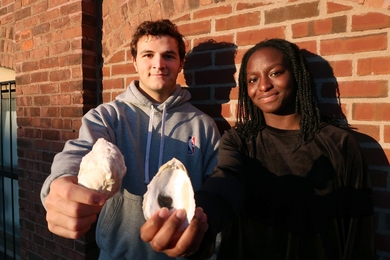Despite the lack of formal training and monetary compensation, families have become a part of the geriatric health care workforce, researchers at the MIT Workplace Center at the Sloan School of Management have concluded in a new report.
"We call family caregivers a 'shadow workforce' because the care they are providing is largely unseen and unrecognized, especially inside health care institutions," said Ann Bookman, executive director of the MIT Workplace Center.
This point is underscored in the report, "Caring for the Caregivers," which was prepared for the Massachusetts Executive Office of Elder Affairs. The report presented 10 recommendations for improving resources for elder caregivers in Massachusetts, such as expanding support services, training and wellness programs for caregivers, and making elder care information more accessible so that families can get help before a crisis arises.
Bookman said some 700,000 Massachusetts residents are involved in caring for elders and disabled family members, and it is estimated that they spend 697 million hours a year providing care at an annual market value of $6,914,000,000.
"A significant shift in cultural attitudes toward aging and elder care is needed if the work of family caregivers is to become fully visible and fully valued," she said. The MIT research also challenges the common assumption that family caregivers provide care only in private homes. "What we observed is that families are playing an important role in hospitals, in rehabilitation facilities and nursing homes and in outpatient settings as well," Bookman said.
One of the key issues identified by caregivers in the MIT study was the lack of basic information about how to find elder care services and caregiver support.
"Just the word 'caregiver' is a problem because most people don't think of themselves as caregivers until they are at a crisis point," said Joan Butler, executive director of Minuteman Senior Services in Burlington, Mass., and contributor to the MIT report.
"You don't need to have 24/7 kind of involvement to be considered a caregiver," Butler said. "In fact, if there's any older person in your life that you're concerned about, and you're starting to ratchet up your contact with them and your concern, then you're a caregiver. And there's lots of support out there."
The MIT Workplace Center was founded in 2001 and is funded by the Alfred P. Sloan Foundation to address the current mismatch between existing workplace policies and practices and the changing work force. The Center's goal is to stimulate change on the level of private sector workplaces, community-based family care agencies and public policy.
A version of this article appeared in MIT Tech Talk on November 28, 2007 (download PDF).





